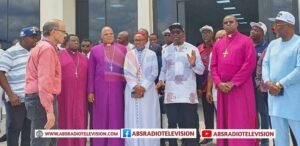
Governor Chukwuma Charles Soludo on Wednesday hosted a high-level delegation of Anglican Bishops at the Governor’s Lodge, Awka, led by His Grace, the Most Reverend Alexander Ibezim, Archbishop of the Ecclesiastical Province of the Niger and Bishop of Awka Diocese.
The visit, which Governor Soludo described as “an honour,” included an extensive tour of key government facilities and development projects across the state capital. The delegation visited Solution Fun City, the Light House facility, before concluding at the Governor’s Lodge for formal discussions.
During the engagement, Governor Soludo highlighted the critical role of the Anglican Church in Anambra’s development trajectory, describing it as “the largest civil society institution in our state.” He emphasized that the Church’s partnership remains “truly invaluable” to his administration’s success. “Your prayers, wisdom, and unwavering moral support inspire and energize this administration every day,” the governor told the bishops, underscoring the spiritual foundation that underpins his government’s activities.
This emphasis on church-state partnership carries particular weight given the Anglican Church’s significant influence across the Southeast region. The Ecclesiastical Province of the Niger, which Archbishop Ibezim leads, covers multiple dioceses including Awka, Enugu, Nsukka, and surrounding areas. The Archbishop has been a prominent voice in regional development and social justice issues, making his endorsement of the governor’s initiatives especially meaningful. Building on this regional influence, the Awka Diocese itself has grown since its establishment in 1977 to become one of the most influential Anglican dioceses in Nigeria.
The diocese operates numerous educational institutions, healthcare facilities, and community development programs across Anambra State, including several secondary schools such as the renowned Anglican Girls’ Grammar School, Awka. These extensive networks complement the diocese’s active involvement in poverty alleviation initiatives throughout the state. Such institutional strength reflects a broader historical pattern of cooperation between the Anglican Church and successive Anambra State governments, particularly in areas of education and healthcare delivery.
The Church’s extensive network of schools and hospitals across the state has consistently complemented government efforts in providing essential services to citizens. Moreover, under previous administrations, the Anglican Church has been instrumental in peace-building efforts, particularly during periods of civil unrest, while consistently advocating for good governance and transparent leadership. Given this history of collaboration, the significance of Wednesday’s visit becomes even more apparent when considering the delegation’s comprehensive tour of government facilities.
Their visit to Solution Fun City, one of Governor Soludo’s flagship recreational projects, demonstrates the administration’s commitment to showcasing development achievements to key stakeholders. The facility, designed to boost tourism and provide entertainment options for families, represents part of the government’s broader urban regeneration efforts that have characterized Soludo’s tenure.
Similarly, the Light House facility tour suggests the administration’s transparency in allowing religious leaders to assess government projects firsthand, fostering accountability and partnership in development initiatives. This openness to scrutiny from religious leaders reflects the governor’s understanding of their influential position within Anambra’s social fabric. Indeed, Christianity dominates Anambra State’s religious landscape, with the Anglican Church being one of the largest denominations alongside Catholic and Pentecostal churches.
The state’s Christian population exceeds 95%, making religious leaders influential stakeholders in governance and community development. This demographic reality means that the Anglican Communion’s extensive presence in Nigeria, through its various provinces and dioceses operating over 10,000 congregations nationwide, maintains one of the largest educational and healthcare networks among religious organizations in the country. Against this backdrop of religious influence, Governor Soludo’s administration has prioritized infrastructure development, youth empowerment, and urban regeneration since taking office in March 2022.
The Anglican Church’s endorsement and partnership could prove crucial as the governor seeks re-election in November 2025, particularly given that religious endorsements traditionally carry significant weight in Anambra politics. The Anglican Church’s support could influence voter perceptions, especially among the educated middle class and traditional Anglican strongholds across the state.
This political dimension becomes particularly relevant as the visit occurs against increasing political activities ahead of the November gubernatorial election, where Governor Soludo will seek a second term under the All Progressives Grand Alliance (APGA) platform. The governor’s emphasis on the Church’s “moral support” comes as his administration implements various reforms, including the controversial clearing of illegal structures and the transformation of various communities across the state.
Beyond the immediate political implications, the meeting likely explored potential areas of expanded collaboration between the state government and the Anglican Church, particularly in education, healthcare, and community development. The Church’s extensive grassroots network could prove valuable in implementing government programs at the community level, while the Anglican Church’s historical involvement in education aligns perfectly with Governor Soludo’s education reform initiatives, including the recent transformation of teacher training colleges and improvements in public school infrastructure.
The visit concluded with the governor’s characteristic optimism, expressing hope that “Anambra continue to win,” reflecting his administration’s confidence in ongoing development efforts and the partnership with key stakeholders like the Anglican Church. This collaboration between one of Nigeria’s most influential religious institutions and a reform-minded administration suggests a promising foundation for continued development in Anambra State.



